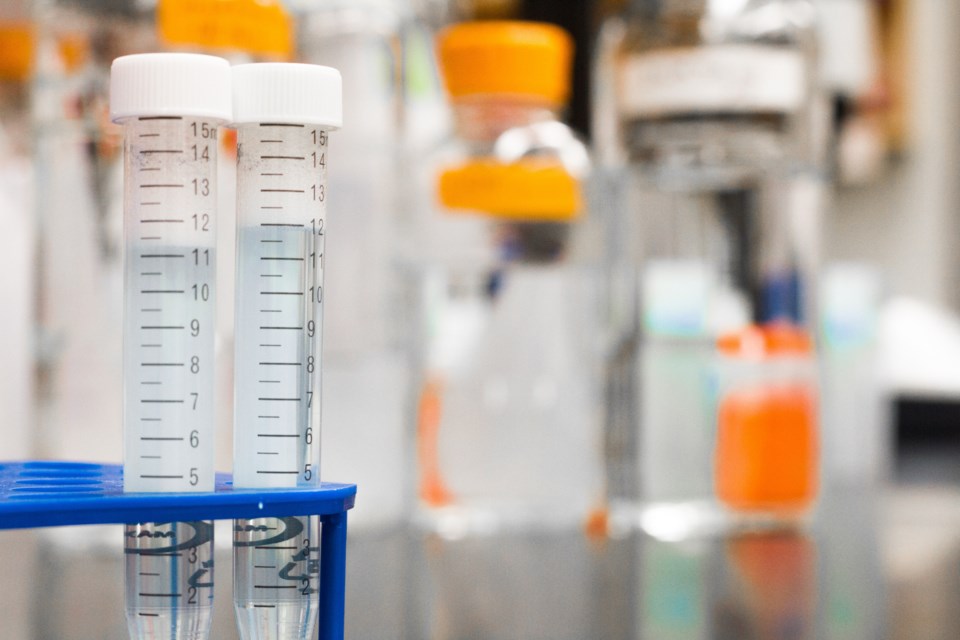Early wastewater testing results are showing a reduced concentration of both the COVID-19 and the UK variant B.1.1.7 in Barrie.
Meanwhile, a laboratory conducting the testing on sewage waste reports that COVID levels are also declining in Orillia, Midland and Collingwood.
But more of the cases — 67 per cent, up from 61 per cent a week ago — of the COVID-19 cases reported in Simcoe-Muskoka this week are of a variant of concern. That proportion is expected to continue to go up.
“What we’re seeing is the variants of concern taking over and dominating among our COVID cases,” local medical officer of health Dr. Charles Gardner said during a weekly call with media on Tuesday. “This is what we were predicting, considering that they’re more communicable.
“But we’re also seeing as a whole our number come down a bit and our total case count for COVID has also come down a bit," he added.
Gardner explained that tests of local wastewater showed detectable levels of the variant in late January, followed by a decline in February to not being detectable, and then later in February it went up again, following the pattern of cases reported. Levels have dropped back down since then, correlating with the case count.
Ontario Tech University’s research group has been working on the COVID-19 wastewater testing project for the four Simcoe County communities for about three weeks.
Andrea Kirkwood, of the university's science faculty, said the SARS-CoV-2 virus was detected in all of the samples and are now showing lower concentrations.
“It’s really neat to see that three weeks ago the numbers were much higher than they are now," she said.
The Oshawa-based university is testing for the presence of COVID-19 in the four Simcoe County communities, as well as several in the Durham Region.
Another academic lab at the University of Ottawa is testing specifically for the UK variant in Barrie, where the concentration has been declining since testing began about a month ago.
In the testing for COVID-19, Barrie is showing the highest concentration of the Simcoe County communities, while Collingwood is showing the lowest, Kirkwood said. Some of the Collingwood samples have such a low concentration that the virus hasn’t been detected.
The latest test results from last week aren’t yet part of that analysis, she added.
The results have been variable, but do show a gradual decline over the three-week period in the trend analysis, Kirkwood said.
Ongoing testing will determine whether the trend continues or whether it will change now that restrictions have eased somewhat in the Simcoe-Muskoka area.
“The hope is that with a few more weeks of data, if we see any upticks in detection or what we call viral loads, then hopefully that will give the public health units some time to maybe do some deeper dives into community spread and cases,” Kirkwood said. “It’s being shown now, throughout the world, that this type of wastewater data can provide an early warning.”
In the Ottawa lab, a test for the UK variant was developed through a collaborative effort between the University of Ottawa and the Children's Hospital of Eastern Ontario (CHEO) just before Dr. Gardner declared Barrie "ground zero" for that variant.
Researcher Tyson Graber, a scientist with the CHEO Research Institute, developed and designed the assay to detect B.1.1.7 in wastewater in the lab, but it hadn’t yet been used on a real-world sample.
“What we needed to do was validate this” through real samples, not just those based in the lab, said Graber.
When the team learned about the deadly outbreak at Barrie's Roberta Place long-term care facility was linked to the variant, they reached out to the city for wastewater samples.
The test proved effective and is now being used by universities and labs across the country. Meanwhile, the lab received provincial funding for its work and Barrie municipal officials are continuing to send three samples each week for testing.
There has been a great deal of variability, Graber said, but there is indication there are far fewer cases in Barrie.
“Some of the days are very, very close to the threshold of detection. So there aren’t a lot of cases in Barrie right now, in general for the virus, and probably even fewer cases of the UK variant,” he said. “Although we can detect the UK variant in the past week or so, it’s at extremely low levels.
“During the Roberta Place outbreak, it was readily detectable," he added. "So we could see it and we could actually quantify what the portion of the UK variant versus the rest of the viral variants, all the other viruses, what proportion of the UK variant made up that sample.”
Dr. Gardner reported Tuesday that there are now two cases in Simcoe-Muskoka identified as the P.1 Brazilian variant.
Wastewater testing for both the Brazilian and South African variants are not yet available. Graber said the Ottawa lab is working on them, but they are still at least a few weeks away from development.
Kirkwood explained that her lab uses a “normalization” approach to examine the variable flows during sample collecting from the sewer shed. That involves comparing the SARS-CoV-2 virus to the pepper mild mottle virus commonly found in wastewater.
“That’s how we’re able to, more or less, quantify the SARS-CoV-2 viral loads for each sample. So they’re comparable from date to date,” she said.
A dashboard for wastewater results is expected to be developed, similar to the provincial dashboard for case data, by the provincial government toward the end of the month.



